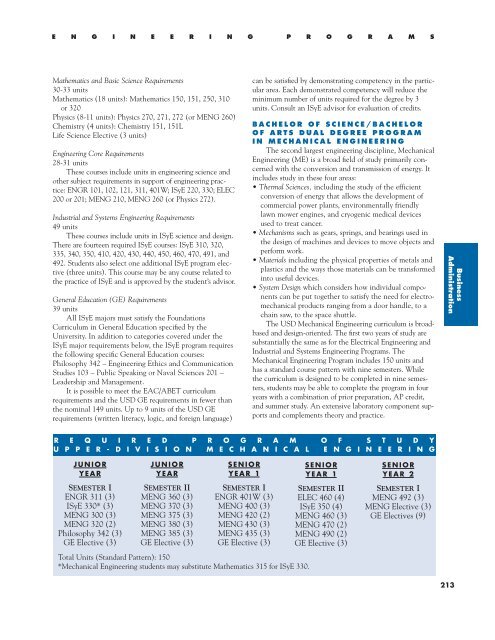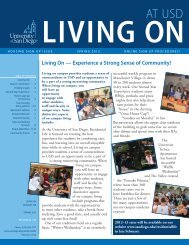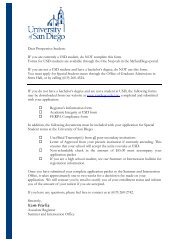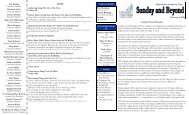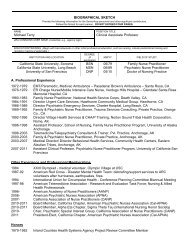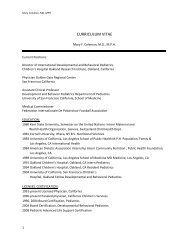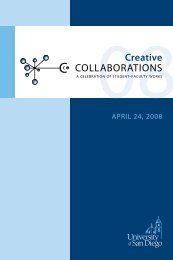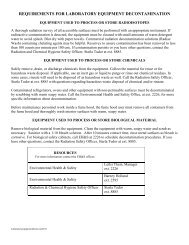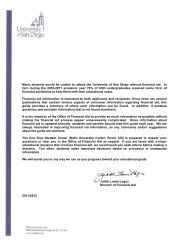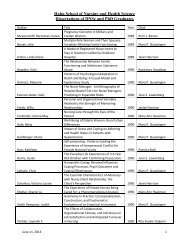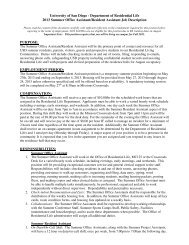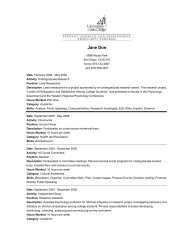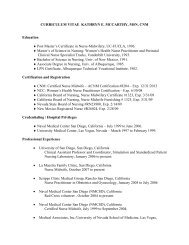**USD UGB 04-06 - University of San Diego
**USD UGB 04-06 - University of San Diego
**USD UGB 04-06 - University of San Diego
Create successful ePaper yourself
Turn your PDF publications into a flip-book with our unique Google optimized e-Paper software.
E N G I N E E R I N G P R O G R A M S<br />
Mathematics and Basic Science Requirements<br />
30-33 units<br />
Mathematics (18 units): Mathematics 150, 151, 250, 310<br />
or 320<br />
Physics (8-11 units): Physics 270, 271, 272 (or MENG 260)<br />
Chemistry (4 units): Chemistry 151, 151L<br />
Life Science Elective (3 units)<br />
Engineering Core Requirements<br />
28-31 units<br />
These courses include units in engineering science and<br />
other subject requirements in support <strong>of</strong> engineering practice:<br />
ENGR 101, 102, 121, 311, 401W; ISyE 220, 330; ELEC<br />
200 or 201; MENG 210, MENG 260 (or Physics 272).<br />
Industrial and Systems Engineering Requirements<br />
49 units<br />
These courses include units in ISyE science and design.<br />
There are fourteen required ISyE courses: ISyE 310, 320,<br />
335, 340, 350, 410, 420, 430, 440, 450, 460, 470, 491, and<br />
492. Students also select one additional ISyE program elective<br />
(three units). This course may be any course related to<br />
the practice <strong>of</strong> ISyE and is approved by the student’s advisor.<br />
General Education (GE) Requirements<br />
39 units<br />
All ISyE majors must satisfy the Foundations<br />
Curriculum in General Education specified by the<br />
<strong>University</strong>. In addition to categories covered under the<br />
ISyE major requirements below, the ISyE program requires<br />
the following specific General Education courses:<br />
Philosophy 342 – Engineering Ethics and Communication<br />
Studies 103 – Public Speaking or Naval Sciences 201 –<br />
Leadership and Management.<br />
It is possible to meet the EAC/ABET curriculum<br />
requirements and the USD GE requirements in fewer than<br />
the nominal 149 units. Up to 9 units <strong>of</strong> the USD GE<br />
requirements (written literacy, logic, and foreign language)<br />
can be satisfied by demonstrating competency in the particular<br />
area. Each demonstrated competency will reduce the<br />
minimum number <strong>of</strong> units required for the degree by 3<br />
units. Consult an ISyE advisor for evaluation <strong>of</strong> credits.<br />
BACHELOR OF SCIENCE/BACHELOR<br />
OF ARTS DUAL DEGREE PROGRAM<br />
IN MECHANICAL ENGINEERING<br />
The second largest engineering discipline, Mechanical<br />
Engineering (ME) is a broad field <strong>of</strong> study primarily concerned<br />
with the conversion and transmission <strong>of</strong> energy. It<br />
includes study in these four areas:<br />
• Thermal Sciences, including the study <strong>of</strong> the efficient<br />
conversion <strong>of</strong> energy that allows the development <strong>of</strong><br />
commercial power plants, environmentally friendly<br />
lawn mower engines, and cryogenic medical devices<br />
used to treat cancer.<br />
• Mechanisms such as gears, springs, and bearings used in<br />
the design <strong>of</strong> machines and devices to move objects and<br />
perform work.<br />
• Materials including the physical properties <strong>of</strong> metals and<br />
plastics and the ways those materials can be transformed<br />
into useful devices.<br />
• System Design which considers how individual components<br />
can be put together to satisfy the need for electromechanical<br />
products ranging from a door handle, to a<br />
chain saw, to the space shuttle.<br />
The USD Mechanical Engineering curriculum is broadbased<br />
and design-oriented. The first two years <strong>of</strong> study are<br />
substantially the same as for the Electrical Engineering and<br />
Industrial and Systems Engineering Programs. The<br />
Mechanical Engineering Program includes 150 units and<br />
has a standard course pattern with nine semesters. While<br />
the curriculum is designed to be completed in nine semesters,<br />
students may be able to complete the program in four<br />
years with a combination <strong>of</strong> prior preparation, AP credit,<br />
and summer study. An extensive laboratory component supports<br />
and complements theory and practice.<br />
Business<br />
Administration<br />
R E Q U I R E D P R O G R A M O F S T U D Y<br />
U P P E R - D I V I S I O N M E C H A N I C A L E N G I N E E R I N G<br />
JUNIOR<br />
YEAR<br />
SEMESTER I<br />
ENGR 311 (3)<br />
ISyE 330* (3)<br />
MENG 300 (3)<br />
MENG 320 (2)<br />
Philosophy 342 (3)<br />
GE Elective (3)<br />
JUNIOR<br />
YEAR<br />
SEMESTER II<br />
MENG 360 (3)<br />
MENG 370 (3)<br />
MENG 375 (3)<br />
MENG 380 (3)<br />
MENG 385 (3)<br />
GE Elective (3)<br />
SENIOR<br />
YEAR 1<br />
SEMESTER I<br />
ENGR 401W (3)<br />
MENG 400 (3)<br />
MENG 420 (2)<br />
MENG 430 (3)<br />
MENG 435 (3)<br />
GE Elective (3)<br />
Total Units (Standard Pattern): 150<br />
*Mechanical Engineering students may substitute Mathematics 315 for ISyE 330.<br />
SENIOR<br />
YEAR 1<br />
SEMESTER II<br />
ELEC 460 (4)<br />
ISyE 350 (4)<br />
MENG 460 (3)<br />
MENG 470 (2)<br />
MENG 490 (2)<br />
GE Elective (3)<br />
SENIOR<br />
YEAR 2<br />
SEMESTER I<br />
MENG 492 (3)<br />
MENG Elective (3)<br />
GE Electives (9)<br />
213


